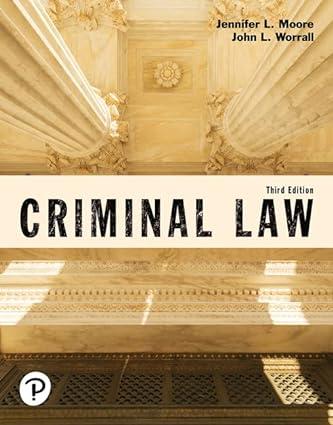Hassan Abu-Jihaad was convicted of disclosing national defense information and of providing material support to terrorist by
Question:
Hassan Abu-Jihaad was convicted of disclosing national defense information and of providing material support to terrorist by a jury in the District Court of Connecticut. Abu-Jihaad moved for a judgment of acquittal and a new trial. The District Court of Connecticut partially granted the motion for an acquittal and set aside the providing material support conviction. The conviction for disclosing defense information remains in effect.
. . . Following a six-day trial in March 2008, a jury convicted Defendant Hassan Abu-Jihaad on two charges: (1) disclosing national defense information to those not entitled to receive it in violation of 18 U.S.C. § 793(d); and (2) providing material support to terrorists in violation of 18 U.S.C.
§ 2339A and § 2. The Government alleged that in 2001, while Mr. Abu-Jihaad was serving as a U.S. Navy Signalman aboard the destroyer, the U.S.S. Benfold, he disclosed classified information regarding the movement of the Fifth Fleet Battle Group, which included the aircraft carrier, the U.S.S. Constellation, to individuals in London associated with Azzam Publications, an organization that the Government alleged supported violent Islamic jihad.
According to the Government, Mr. Abu-Jihaad knew or intended that the information he disclosed would be used to kill United States nationals. By its verdict, the jury agreed with the Government’s assertions. Mr. Abu-Jihaad now moves for judgment of acquittal and for a new trial.
. . . The document—which was often referred to at trial as the “Battlegroup Document”—purported to predict ship movements beginning on March 15, 2001, and therefore, the information contained in the document appeared to have been provided before that date. The first page of the document began as follows:
In the coming days the United States will be deploying a large naval/marine force to the Middle East.
This will be a two group force: the Battle Group (BG) and the Amphibious Readiness Group (ARG)—these groups will be replacing the already deployed groups in the gulf . . .
Beneath this text was a diagram labeled “Formations Through Straits,” which purported to show in a two-column formation each of the components of the battlegroup. Thereafter, the document described the capabilities of each vessel in the battlegroup, led by the aircraft carrier, the U.S.S.
Constellation, plus smaller vessels including a destroyer named the U.S.S. Benfold . . . The document ended with an overall assessment of the battlegroup’s vulnerabilities.
[The document was found on a floppy disk in the home of Babar Ahmad, who had ties with a suspected terrorist organization, Azzam Publications. Abu-Jihaad also emailed and purchased videos from Azzam Publications.]
. . . As the Court told the jury in its instructions on the law, to be found guilty of disclosing national defense information to those not entitled to receive it in violation of 18 U.S.C.
§ 793(d), the Government was required to prove the following essential elements:
1. First, that Mr. Abu-Jihaad lawfully had possession of, access to, control over, or was entrusted with information relating to the national defense.
2. Second, that Mr. Abu-Jihaad had reason to believe that such information could be used to the injury of the United States or to the advantage of any foreign nation.
3. Third, that Mr. Abu-Jihaad willfully communicated, delivered, transmitted or caused to be communicated, delivered, or transmitted such information.
4. Fourth, that Mr. Abu-Jihaad did so to a person not entitled to receive it.
While Mr. Abu-Jihaad’s arguments for a judgment of acquittal are substantial, the Court concludes that the evidence presented on the disclosure of classified information charge was neither equal, nor nearly equal, to the evidence in support of a theory of innocence. Accordingly, the Court declines to set aside the jury’s conviction on that charge.
. . . Mr. Abu-Jihaad was also convicted of providing material support to terrorists in violation of 18 U.S.C. § 2339A and
§ 2. Section 2339A makes it a crime to provide “material support or resources . . . knowing or intending that they are to be used in preparation for, or in carrying out, a violation”
of certain enumerated statutes. Id. “Material support or resources” are defined as follows: “currency or other financial securities, financial services, lodging, training, safehouses, false documentation or identification, communications equipment, facilities, weapons, lethal substances, explosives, personnel, transportation, and other physical assets, except medicine or religious materials.” Mr. Abu-Jihaad was charged with providing “personnel” and “physical assets,” knowing or intending that such support would be used in preparation for, or in carrying out, a violation of 18 U.S.C. § 2332(b)—that is, a plan to kill United States nationals . . .
Taking the evidence in the light most favorable to the Government and fully cognizant of the deference owed to the jury, the Court does not believe that a rational juror could conclude beyond a reasonable doubt that Mr. Abu-Jihaad provided material support to Azzam in the form of a physical asset. The Court says this for two principal reasons.
First and foremost, there was no evidence whatsoever regarding how Mr. Abu-Jihaad transmitted national defense information to Azzam, what was said when the information was provided, or how he expected Azzam would distribute or transmit the information he provided . . . Second, the Government’s emphasis on what was supposedly “reasonably foreseeable” to Mr. Abu-
Jihaad does not comport with the requirements of 18 U.S.C. § 2 (b) . . . For the reasons stated, the Court GRANTS IN PART AND DENIES IN PART the Motion for Judgment of Acquittal.
Questions:-
1. Identify the two crimes the defendant is charged with and list the elements of each offense.
2. Identify how the court ruled on the defendant’s motion for a judgment of acquittal for each offense.
Step by Step Answer:






